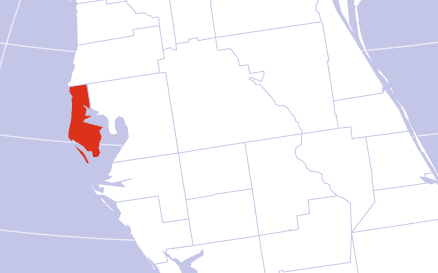Pinellas County Cannabis – Is It Legal & Where To Buy 2026
- Florida Cannabis
- Pinellas County Cannabis
Is Cannabis Cultivation Legal in Pinellas County?
Cannabis cultivation is legal in Pinellas County as long as it is intended for medical use and the cultivator obtains the right permit from the State of Florida. The Florida Medical Marijuana Use Act (Chapter 381.986 of the 2021 Florida Statutes) permits Medical Marijuana Treatment Centers (MMTC) to cultivate cannabis intended for medical use in the state. However, personal cultivation of cannabis at home is illegal in Florida. Also, the cultivation of cannabis for recreational use is prohibited. The Office of Medical Marijuana Use (OMMU), under the Florida Department of Health, administers the medical marijuana program in Florida. The OMMU is currently not receiving new Medical Marijuana Treatment Centers license applications.
Per the Medical Marijuana Use Act, counties can enact ordinances to determine the locations, and regulate the operations, of medical marijuana treatment centers. Pinellas County does not have an ordinance to regulate the cultivation of cannabis in the county. However, a medical marijuana treatment center cannot be located within 500 feet of a school in Pinellas County.
Is Cannabis Manufacturing Legal in Pinellas County?
The manufacture of cannabis for medical use is legal in Pinellas County. The Medical Marijuana Use Act permits medical marijuana treatment centers to manufacture cannabis products in the state. A licensed MMTC cultivates, processes, transports, and dispenses cannabis products in Florida.
Is Cannabis Retail Legal in Pinellas County?
Medical cannabis retail is legal in Pinellas County but not recreational marijuana. The Medical Marijuana Use Act permits medical marijuana treatment centers to sell medical marijuana products to patients and caregivers. Section 381.986(11)(b) of the Medical Marijuana Use Act permits counties and municipalities to ban marijuana dispensaries or place the same limitations on them as those placed on pharmacies. Pinellas County allows marijuana dispensaries to operate within its territory. Edibles made from marijuana oil are the only marijuana edibles allowed in Pinellas County. Other forms of marijuana are permitted, including smokable marijuana.
Is Cannabis Delivery Legal in Pinellas County?
Cannabis delivery for medical use is permitted in Pinellas County. The Medical Marijuana Use Act allows dispensaries to deliver medical marijuana products to medical marijuana ID card holders as prescribed by their physicians.
How to Get Medical Marijuana Card in Pinellas County
Pinellas County residents interested in obtaining the Florida medical marijuana card must be registered on the state’s Medical Marijuana Use Registry. Applicants diagnosed with one of the qualifying medical conditions can be registered on the MMUR by qualified physicians. The qualifying medical conditions for medical marijuana treatment in Florida are:
- Terminal condition
- Chronic nonmalignant pain
- Cancer
- Epilepsy
- HIV/AIDS
- Glaucoma
- Crohn’s disease
- Post-traumatic stress disorder
- Parkinson’s disease
- Amyotrophic lateral sclerosis
- Multiple sclerosis
If a qualified physician determines that a patient with a qualifying medical condition will benefit from medical marijuana therapy, the physician registers the patient on the MMUR. The OMMU will then send the patient two emails containing their username and a temporary password. After receiving the emails, the patient can then apply for an MMUR ID card.
Patients can apply for the MMUR ID cards online or by mail. Online applicants must log into the MMUR with the links provided in their emails and access the “Your Card” page on the portal. They must provide their driver’s license or a state-issued ID card and proof of residency. Applicants must pay the processing fees of $75 with e-checks, debit cards, or credit cards.
An applicant applying via mail must print and complete the Patient Application form. They must attach the following with the application form:
- Driver’s license or state-issued ID card
- A full-face, colored, passport-type 2x2 inches photograph
- Proof of residency
- A $75 money order or check made out to the Florida Department of Health
The applicant can then mail their applications to:
Office of Medical Marijuana Use
PO Box 31313
Tampa, FL 33631-3313
It takes up to ten business days for approval when applying for a Florida medical marijuana card online while an application sent by mail takes up to 15 days to be approved. An applicant can check the status of their application by calling (800) 808-9580. The OMMU will mail MMUR ID cards to successful applicants. In Florida, medical marijuana patients must renew their MMUR ID cards annually.
How Has Cannabis Legalization Impacted the Economy of Pinellas County?
While presenting an annual update on medical marijuana use in Florida, the 2022 OMMU Annual report did not report on the financial impact of cannabis on the state. However, the report shows that 22 licensed MMTCs with 396 dispensing locations operate in the state. The Pinellas County 2020 Annual Comprehensive Financial Report also did not reflect revenue from marijuana sales. Therefore, it is difficult to determine the economic impact of the legalization of marijuana for medical use in Pinellas County.
The Effects of Cannabis Legalization on Crime Rates in Pinellas County
The Florida Medical Marijuana Use Act was enacted in 2016. Crime data provided by the Pinellas County Sheriff’s Office (PCSO) to the Federal Bureau of Investigation (FBI) showed that there were no marijuana sales or marijuana possession arrests in the county from 2017 to 2020. The PCSO did not submit marijuana possession and sales arrest figures before 2017.
The DUI arrest figures submitted by the Pinellas County Highway Patrol to the FBI does not include DUI arrest figures before 2017. Therefore, it is difficult to determine the effects of legalizing medical cannabis on crime rates in Pinellas County without marijuana-related arrest figures from the years before the legalization of marijuana in the state.
Apply For a Medical Cannabis Card
Book an AppointmentCities Dispensary
